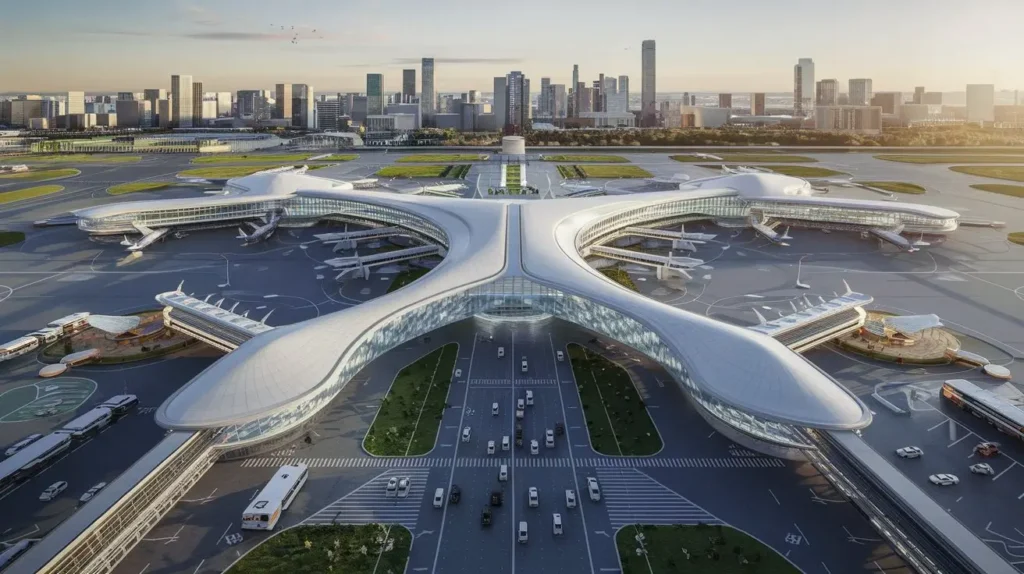I. Introduction
The CPK Central Airport is poised to become a transformative hub in global aviation, combining state-of-the-art design with cutting-edge technology. Poland’s geographic location, at the crossroads of major European and Asian routes, makes CPK a strategic hub for connecting key international destinations, enhancing accessibility, and fostering regional economic growth. As airport infrastructure evolves, AI has become an integral element of modern design and construction. This article explores how AI-powered project management is revolutionizing the construction of CPK Central Airport, enhancing efficiency, safety, and adaptability.
II. The Role of AI in Smart Airport Design
Smart airports use advanced technologies to optimize passenger experience, streamline operations, and reduce environmental impact. AI is at the heart of this evolution, offering tools such as predictive maintenance systems, automated scheduling, and real-time analytics that reshape airport construction and management. Key features of AI-driven design include predictive analysis, optimization algorithms, and real-time monitoring, all contributing to smoother operations. By integrating AI into airport projects, developers can enjoy benefits such as reduced costs, improved safety, and more efficient resource management.
III. AI-Powered Project Management Tools for CPK
The construction of CPK Central Airport represents a massive undertaking, requiring precise planning, effective resource management, and collaboration among multiple teams. AI offers a significant advantage in project management, enhancing each phase from design to execution. For example, during the design phase, AI can generate multiple design iterations quickly, allowing architects to evaluate and select the most efficient option, ultimately reducing design time and increasing overall project efficiency. Autodesk Construction Cloud is used to streamline design collaboration and track project progress, enhancing communication between teams by providing a centralized platform for sharing documents, tracking updates, and managing tasks in real-time. This makes it easier for teams to work cohesively and stay aligned with project goals.
A. Building Information Modeling (BIM)
AI-enhanced BIM is transforming the way we approach airport construction. By integrating AI into BIM systems, we gain the ability to simulate and visualize entire construction phases before they happen. This reduces the likelihood of costly errors and allows for more accurate planning and coordination across all stakeholders. AI can predict clashes, optimize designs, and ensure seamless collaboration among international teams.
B. Predictive Analytics for Risk Management
Risk management is crucial for the success of any large-scale project like CPK. Predictive analytics powered by AI helps foresee potential issues before they materialize. For instance, using historical data from similar projects, AI can predict potential supply chain disruptions or weather-related delays. This proactive approach allows project managers to mitigate risks early, ensuring that the construction process stays on track.
C. Resource Optimization Algorithms
AI-driven algorithms provide insights into the optimal allocation of resources. For a project as complex as CPK, it is essential to balance the availability of materials, workforce, and equipment effectively. AI algorithms analyze the various factors that impact resource allocation, such as labor availability and equipment usage, to minimize idle time and waste. This results in significant cost savings and ensures efficient resource utilization throughout the project.
D. Real-Time Progress Monitoring Systems
Real-time monitoring is an invaluable aspect of modern construction management, benefiting stakeholders such as project managers and workers by providing immediate updates on project status, allowing for rapid decision-making, and reducing the risk of prolonged delays or unnoticed issues. Using AI and IoT technologies, such as drones equipped with cameras and smart sensors, the progress of the CPK construction project can be tracked with precision. These technologies provide real-time data that helps ensure project milestones are met on schedule. AI-powered systems analyze images from construction sites, drone footage, and sensor data to assess project status and provide up-to-date reports. This enables immediate corrective action if delays or deviations are identified, enhancing overall project efficiency.
IV. Enhancing Airport Construction with AI
A. Automated Design Processes
AI can automate the design phase, using generative algorithms to create multiple design variations. This capability allows architects to quickly evaluate a wide range of design options and choose the most efficient and sustainable one. At CPK, automated design processes have the potential to significantly reduce the time required for planning and enable innovative designs that improve passenger flow and operational efficiency.
B. Intelligent Scheduling and Resource Allocation
The use of AI in scheduling ensures that construction timelines are optimized and resources are allocated efficiently. AI systems can dynamically adapt to unforeseen circumstances, such as adverse weather or supply chain disruptions, by adjusting schedules and reallocating resources as needed. This flexibility minimizes downtime and keeps the project on track.
C. Quality Control and Safety Monitoring
Ensuring quality and safety is paramount in a large-scale construction project like CPK. AI-driven computer vision systems can inspect construction work for deviations from design specifications. Drones equipped with AI capabilities can also monitor safety compliance, identify potential hazards, and flag issues in real time. This ensures that quality standards are met while protecting worker safety on site.
D. Sustainability Optimization
Sustainability is a key focus for the CPK Central Airport. AI plays a significant role in achieving sustainability goals by optimizing energy consumption and resource usage. Machine learning models can predict the environmental impact of different construction methods and help select the most eco-friendly materials. This helps CPK meet its sustainability targets and reduces the airport’s carbon footprint.
V. Smart Infrastructure Integration at CPK
A. IoT-Enabled Sensors for Real-Time Data Collection
The integration of IoT sensors across the airport infrastructure provides real-time data on various metrics such as temperature, air quality, and passenger movement. AI analyzes this data to provide actionable insights that improve operational efficiency. For example, IoT sensors combined with AI algorithms can ensure optimal crowd control and streamline maintenance activities by predicting potential failures before they occur.
B. Automated Baggage Handling Systems
AI-driven automation in baggage handling reduces waiting times and improves accuracy. Machine learning algorithms optimize the flow of baggage from check-in to collection, ensuring that passenger luggage arrives at the correct destination promptly. This not only enhances passenger satisfaction but also reduces the risk of lost or delayed baggage.
C. Smart Lighting and Energy Management
AI systems help manage energy consumption effectively by using predictive algorithms to adjust lighting and HVAC systems based on passenger density, time of day, and weather conditions. This adaptive approach contributes significantly to reducing the airport’s overall energy usage, leading to cost savings and enhanced environmental sustainability.
D. Intelligent Security Systems
Security is a critical component of airport operations. AI solutions, including facial recognition and behavior analysis, can identify potential security threats in real time. AI-powered video analytics can detect suspicious activities, while biometric systems can streamline passenger check-ins, reducing waiting times at security checkpoints and enhancing overall safety.
VI. Overcoming Challenges in AI Implementation
A. Data Privacy and Security Concerns
Implementing AI solutions that rely on vast amounts of data inevitably raises concerns about data privacy and security. CPK must establish robust security protocols, such as data encryption and secure storage solutions, to safeguard passenger data. Close cooperation with data protection authorities ensures compliance with GDPR and other data protection regulations.
B. Integration with Existing Systems
Seamlessly integrating AI with existing aviation infrastructure is challenging but essential. Developing APIs that allow communication between AI tools and legacy systems will be key to successful integration. The modular approach to integration allows the adoption of AI without disrupting ongoing operations.
C. Training and Skill Development for Project Teams
The workforce at CPK needs to be equipped with the necessary skills to effectively use AI tools. Institute AI can offer training programs aimed at upskilling construction teams to work efficiently with AI technologies. These programs focus on practical skills, from understanding AI-driven tools to operating complex monitoring systems, ensuring that teams can make the most out of these advancements.
D. Regulatory Compliance and Approvals
The application of AI in airport operations requires adherence to strict regulatory standards, such as compliance with EASA (European Union Aviation Safety Agency) and FAA (Federal Aviation Administration) guidelines that govern safety, data security, and operational integrity. CPK’s project management team must collaborate closely with aviation regulators to meet all necessary safety and compliance requirements. Institute AI can provide expertise in navigating regulatory landscapes, ensuring that AI systems at CPK adhere to local and international standards.
VII. Future-Proofing CPK with AI
A. Scalability and Adaptability of AI Systems
AI systems implemented at CPK are designed with scalability in mind, enabling the airport to grow and adapt to future needs. The cloud-based infrastructure allows for easy expansion and updates, while AI algorithms can adapt to new data, ensuring that the airport remains at the forefront of technology.
B. Continuous Learning and Improvement
AI thrives on data, and as more operational data is collected, the AI systems at CPK will continue to improve. Institute AI is committed to developing adaptive learning models that evolve with changing airport dynamics, ensuring that CPK remains efficient, safe, and responsive to emerging trends such as autonomous drone monitoring and biometric security advancements.
C. Preparing for Emerging Technologies in Aviation
The aviation industry is constantly evolving, and CPK must be prepared to integrate future technologies. Institute AI supports the CPK project by ensuring compatibility with upcoming innovations, such as autonomous airport vehicles, advanced biometrics, and urban air mobility solutions, thus securing its position as a leading smart airport.
VIII. Institute AI: Cutting-Edge Solutions for CPK
A. AI Models for Compliance Assessment and Design Evaluation
Institute AI can provide advanced AI models, utilizing software such as Autodesk BIM 360 and Revit, to automatically analyze CPK project documentation for compliance with Polish building and aviation regulations. Compliance with these regulations is complex due to strict safety, environmental, and architectural standards, which require detailed and accurate documentation to meet all requirements. AI helps in simplifying this process by ensuring thorough analysis and reducing human error. Autodesk BIM 360 helps in collaborative management and coordination of project documentation, while Revit is used for detailed design modeling and compliance analysis, ensuring accuracy and adherence to standards. This significantly reduces documentation review time by up to 60% and decreases the risk of errors by 80%, ensuring smoother compliance with regulatory standards.
B. Data Lake to Structured Project Assessment
Institute AI can utilize platforms like Microsoft Azure Data Lake and Databricks to convert raw data from multiple sources into a structured project assessment framework, which helps in faster and more informed decision-making. This transformation speeds up the data analysis process by up to 70% and improves assessment accuracy by 40%.
C. Automated Compliance Checking
Institute AI can enable automated compliance checking using tools such as Solibri and PlanRadar, ensuring that design plans adhere to regulations in real time and providing instant feedback. This reduces compliance check times by 80% and detects potential non-compliances early in the design stage, resulting in fewer delays and smoother project execution.
D. Multi-lingual Support
CPK is an international project with stakeholders from different linguistic backgrounds. Institute AI can leverage DeepL and Google Cloud Translation API to provide multi-lingual AI tools that facilitate communication by translating design documents and evaluating submissions in different languages, reducing misunderstandings and improving collaboration. This capability can reduce language-based misunderstandings by 90% and speed up international communication by 50%.
E. Real-time Feedback
Institute AI can facilitate real-time feedback during the design phase through platforms like Procore and Autodesk Construction Cloud. These solutions can offer real-time insights into whether design changes align with regulatory standards, allowing for faster iterations and reducing revision cycles by up to 70%.
IX. Conclusion
The integration of AI in the CPK Central Airport project is expected to transform construction and management. By leveraging AI-powered tools for design, scheduling, monitoring, and sustainability, CPK aims to set a new benchmark for smart airport development by integrating advanced AI technologies, focusing on sustainability, seamless passenger experience, and cutting-edge infrastructure solutions. Institute AI’s role in providing advanced AI solutions and training ensures that the project not only meets current standards but is also ready for future challenges. The focus on efficiency, adaptability, and sustainability positions CPK as a leading example of how AI can be used to create smarter, greener, and more connected airports.




